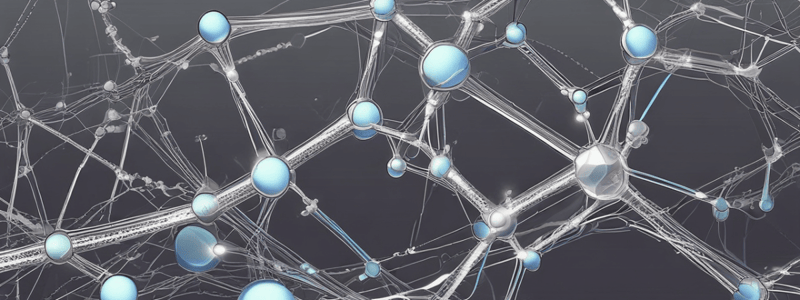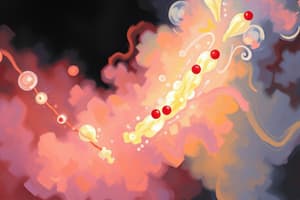Podcast
Questions and Answers
What type of molecular movement involves a change in position?
What type of molecular movement involves a change in position?
- Brownian Motion
- Translational Motion (correct)
- Vibrational Motion
- Rotational Motion
What factor increases the kinetic energy of molecules, resulting in faster molecular movement?
What factor increases the kinetic energy of molecules, resulting in faster molecular movement?
- Particle size
- Concentration
- Temperature (correct)
- Intermolecular Forces
What is the result of the random movement of molecules from an area of higher concentration to an area of lower concentration?
What is the result of the random movement of molecules from an area of higher concentration to an area of lower concentration?
- Diffusion
- Translational Motion
- Brownian Motion
- Uniform distribution (correct)
What type of molecular movement is affected by the viscosity of a fluid?
What type of molecular movement is affected by the viscosity of a fluid?
What is the result of the movement of particles suspended in a fluid due to collisions with surrounding molecules?
What is the result of the movement of particles suspended in a fluid due to collisions with surrounding molecules?
What factor increases the diffusion rate of molecules?
What factor increases the diffusion rate of molecules?
What type of molecular movement involves a change in orientation?
What type of molecular movement involves a change in orientation?
What is the result of the back-and-forth movement of molecules along a bond axis?
What is the result of the back-and-forth movement of molecules along a bond axis?
What factor results in slower molecular movement?
What factor results in slower molecular movement?
What provides visual evidence for the movement of molecules?
What provides visual evidence for the movement of molecules?
Flashcards are hidden until you start studying
Study Notes
Types of Molecular Movement
- Translational Motion: Movement of molecules from one place to another, resulting in a change in position.
- Rotational Motion: Movement of molecules around a fixed axis, resulting in a change in orientation.
- Vibrational Motion: Back-and-forth movement of molecules along a bond axis, resulting in a change in energy.
Factors Affecting Molecular Movement
- Temperature: Increasing temperature increases kinetic energy, resulting in faster molecular movement.
- Intermolecular Forces: Weaker intermolecular forces result in faster molecular movement, while stronger forces result in slower movement.
- Concentration: Higher concentrations result in more frequent collisions, leading to slower molecular movement.
Diffusion
- Definition: The random movement of molecules from an area of higher concentration to an area of lower concentration, resulting in uniform distribution.
- Factors Affecting Diffusion:
- Temperature: Higher temperatures increase diffusion rate.
- Concentration gradient: Steeper gradients increase diffusion rate.
- Particle size: Smaller particles diffuse faster.
- Surface area: Increased surface area increases diffusion rate.
Brownian Motion
- Definition: The random movement of particles suspended in a fluid (liquid or gas) due to collisions with surrounding molecules.
- Evidence for Molecular Movement: Brownian motion provides visual evidence for the movement of molecules.
- Factors Affecting Brownian Motion:
- Temperature: Higher temperatures increase Brownian motion.
- Particle size: Smaller particles exhibit more Brownian motion.
- Viscosity: Lower viscosity increases Brownian motion.
Types of Molecular Movement
- Molecules can exhibit three types of movement: translational, rotational, and vibrational motion.
- Translational motion involves a change in position, resulting from the movement of molecules from one place to another.
- Rotational motion involves a change in orientation, resulting from the movement of molecules around a fixed axis.
- Vibrational motion involves a change in energy, resulting from the back-and-forth movement of molecules along a bond axis.
Factors Affecting Molecular Movement
- Temperature is a key factor, as increasing temperature increases kinetic energy, resulting in faster molecular movement.
- Intermolecular forces also play a role, with weaker forces resulting in faster molecular movement and stronger forces resulting in slower movement.
- Concentration is another important factor, with higher concentrations resulting in more frequent collisions and slower molecular movement.
Diffusion
- Diffusion is the random movement of molecules from an area of higher concentration to an area of lower concentration, resulting in uniform distribution.
- The rate of diffusion is influenced by several factors, including temperature, concentration gradient, particle size, and surface area.
- Increasing temperature increases the diffusion rate, while a steeper concentration gradient also increases the rate.
- Smaller particles diffuse faster, and increased surface area also increases the diffusion rate.
Brownian Motion
- Brownian motion is the random movement of particles suspended in a fluid (liquid or gas) due to collisions with surrounding molecules.
- Brownian motion provides visual evidence for the movement of molecules, supporting the concept of molecular movement.
- The rate of Brownian motion is influenced by several factors, including temperature, particle size, and viscosity.
- Increasing temperature increases Brownian motion, while smaller particles exhibit more motion.
- Lower viscosity increases Brownian motion, allowing particles to move more freely.
Studying That Suits You
Use AI to generate personalized quizzes and flashcards to suit your learning preferences.




